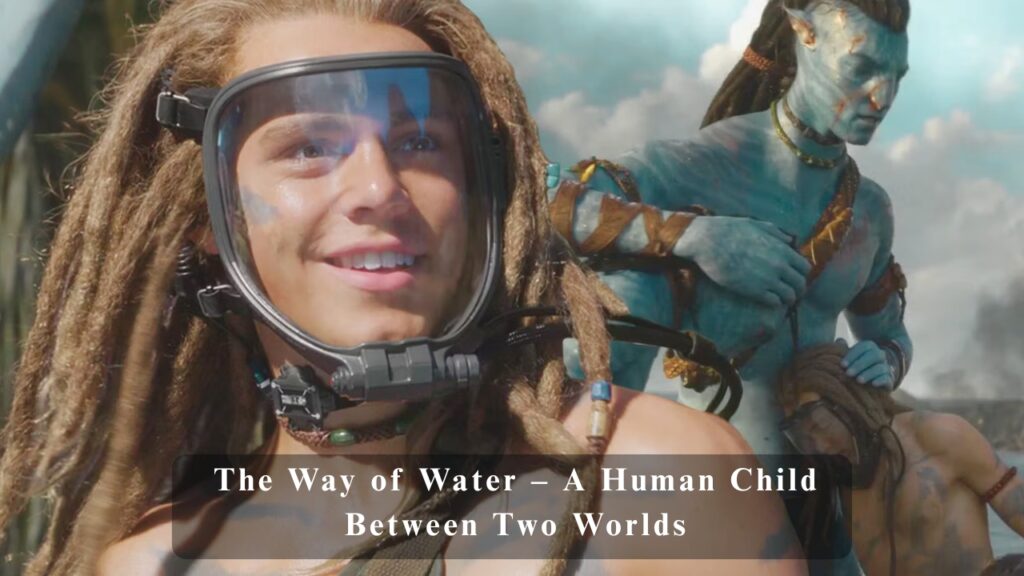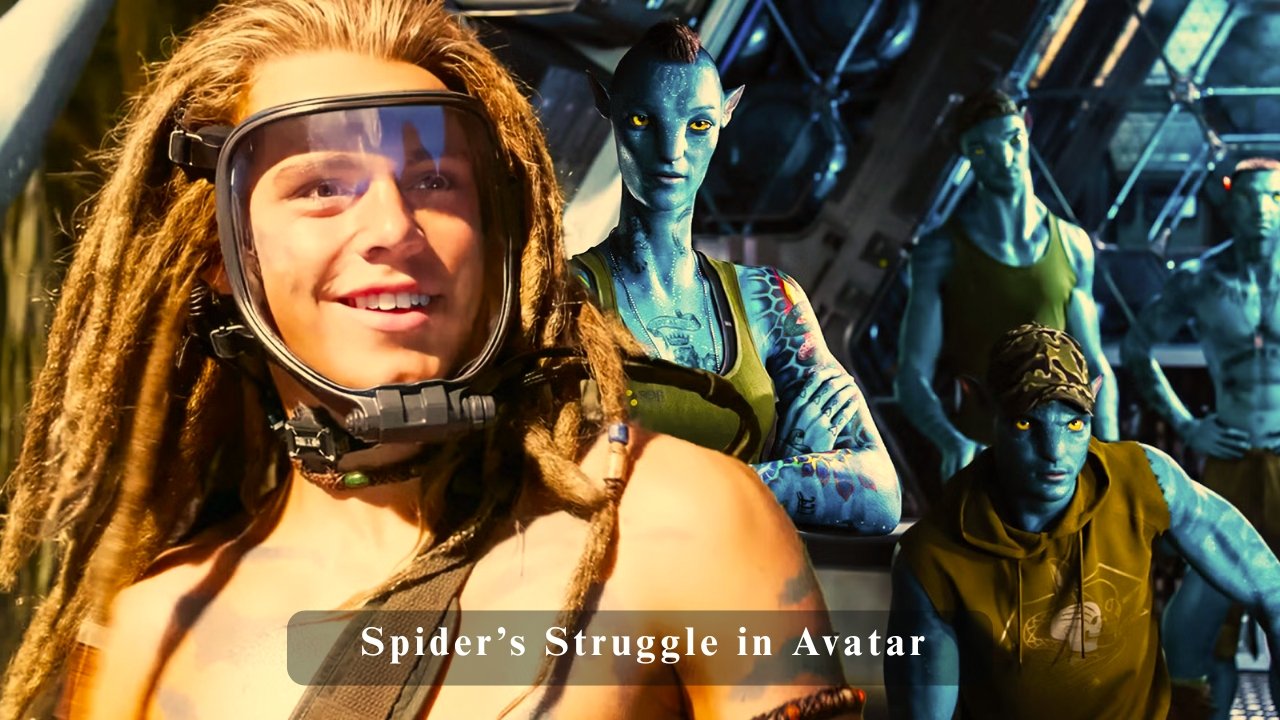Introduction: Why Spider’s Story Matters in Avatar: The Way of Water
As a 25-year-old who grew up watching James Cameron’s Avatar, returning to Pandora in The Way of Water was like revisiting a lost dream. But this time, something different caught my eye—not just the glowing forests or majestic creatures, but a young human boy named Spider. His full name is Miles Socorro, but everyone calls him Spider. And it’s no exaggeration to say that Spider’s struggle in Avatar gave the film one of its deepest emotional cores.
While much of the plot focuses on Jake Sully’s family learning to adapt to the water-dwelling Metkayina clan, Spider’s journey is far more personal. He’s a human child raised among the Na’vi, the very people who once fought against his biological father, Colonel Miles Quaritch. He doesn’t just face physical threats—he deals with emotional abandonment, identity crises, and a constant longing for acceptance.
This article explores Spider’s struggle in Avatar in detail, peeling back the layers of his unique role in the story, his emotional development, and what his journey means for the future of the franchise.
Who Is Spider? Origins and Early Life
Before diving into Spider’s internal conflict, let’s understand where he comes from.
Name: Miles “Spider” Socorro
Species: Human
Biological Father: Colonel Miles Quaritch
Raised by: Scientists at Hell’s Gate and Jake Sully’s family
Best Friends: Kiri, Neteyam, Lo’ak, Tuk
Spider was born on Pandora but was too young to be transported back to Earth when humans were expelled after the war in Avatar (2009). Unlike the Na’vi or avatar hybrids, Spider is a full human who requires a breathing mask to survive in Pandora’s atmosphere. But emotionally, he’s deeply tied to the land, its people, and its values.
And yet, Spider’s struggle in Avatar begins from birth: he’s the son of a notorious human villain but raised with love and empathy by people who should have seen him as the enemy.
Spider’s Bond with Jake Sully’s Children
One of the most heartwarming threads in The Way of Water is Spider’s close bond with Jake Sully’s kids. Despite being human, Spider is treated like an honorary sibling—especially by Kiri and Lo’ak.
He shares their adventures, helps them sneak out, defends them, and stands by their side even when things go wrong. These relationships become his chosen family, especially since Jake and Neytiri never fully accept him as one of their own.
In fact, while Jake shows him some fatherly care, Neytiri harbors clear resentment. She sees him as a symbol of human betrayal—especially since he’s the son of Quaritch. That conflict explodes during the film’s climax, but more on that later.
Still, it’s with Jake’s kids that Spider finds love, laughter, and some sense of belonging. Their acceptance becomes the emotional lifeline in Spider’s struggle in Avatar.
The Biological Burden: Son of Colonel Quaritch
Imagine growing up in a society that hates everything your biological father stood for. That’s Spider’s life in a nutshell.
Colonel Quaritch, as many fans will remember, was the brutal antagonist of the first film. When he died, scientists created an avatar with his memories, bringing him back as a Recombinant. In The Way of Water, this version of Quaritch captures Spider and tries to bond with him.
This is where Spider’s struggle in Avatar reaches an emotional high. He is forced to spend time with a man who is biologically his father but morally his enemy. Quaritch, despite being a manipulative villain, shows some odd moments of tenderness toward Spider. But Spider can never forget what Quaritch did to the Na’vi—or what he still plans to do.
This duality tears Spider apart. Does he reject his roots? Can he love someone who represents everything he despises? Does saving Quaritch in the end make him a traitor or a son?
Spider’s Kidnapping: A Symbolic Rebirth
When Spider is captured by Quaritch’s team, he is thrown into a terrifying world of violence and manipulation. But in many ways, this kidnapping is also a symbolic rebirth.
It forces him to confront the very things he never wanted to face:
His father’s legacy
His own human limitations
His moral compass
During captivity, he’s not tortured physically, but emotionally. Quaritch attempts to manipulate him using blood ties and twisted affection. Spider resists, at first. But as the days pass, a strange dynamic begins to form.
He watches Quaritch bond with a banshee. He sees him hesitate before hurting innocent creatures. These humanizing moments confuse Spider, making him question his black-and-white understanding of good and evil.
This inner conflict is at the very heart of Spider’s struggle in Avatar—the longing for family versus the need to reject everything his father stands for.
A Boy Without a Tribe: Identity and Isolation

Even when Spider is back among the Na’vi, he doesn’t belong. Even when he’s with humans, he doesn’t fit in.
This is a recurring theme that hits home for many people: feeling like you exist in the margins of two worlds. For Spider, this isn’t metaphorical—it’s literal.
With the Na’vi: He’s not one of them. No neural queue. No ability to breathe their air. No blue skin.
With humans: He’s seen as a wild boy who has “gone native.”
This alienation breeds a quiet sorrow in Spider. It shows in his silences, his longing glances, and the emotional weight he carries. Spider’s struggle in Avatar is one of deep, unspoken loneliness.
But through this pain, he becomes one of the most layered characters in the franchise.
Neytiri’s Threat: The Breaking Point
Toward the film’s climax, Neytiri threatens to kill Spider in front of Quaritch to get him to surrender. It’s one of the most gut-wrenching scenes in the movie. Here’s why:
It shows that Neytiri still sees Spider as human—not her child.
Jake doesn’t stop her immediately, which breaks Spider emotionally.
Quaritch hesitates—not out of strategy, but possibly fatherly instinct.
In that single moment, Spider realizes he is truly alone. Neither side would die for him. Neither side fully accepts him. And yet, after the battle, he saves Quaritch from drowning.
That act of mercy, despite everything, shows Spider’s depth. He chooses compassion over revenge. Spider’s struggle in Avatar is no longer just about survival—it becomes a fight to hold onto his humanity.
Visual Language: Spider’s Role Through Cinematography
James Cameron uses clever visual cues to highlight Spider’s struggle in Avatar:
His breathing mask represents the physical barrier between him and the Na’vi.
He often stands apart from groups, symbolizing his social isolation.
He’s surrounded by water, a metaphor for rebirth and emotional depth.
In the final scene, his silhouette is small against the horizon, emphasizing his search for place.
These subtle visuals deepen our empathy and show how cinema can speak without words.
Kiri and Spider: A Future of Unity?
Among all the characters, Kiri is the one who truly sees Spider. Their bond is quiet but powerful. Both are outcasts. Both question their origins. Both seek answers.
There are hints of a future romance or at least a spiritual partnership between the two. If Kiri represents the mystery of Eywa, Spider represents the unpredictability of human nature. Together, they might symbolize a future where differences no longer divide.
Spider’s struggle in Avatar may evolve into a message of hope—where mixed identities become the path to peace.
What Does Spider Symbolize?
Spider isn’t just a character. He’s a symbol:
Of the innocent caught in the crossfire
Of bridges between warring cultures
Of what happens when love and blood conflict
Of the emotional toll of being “between worlds”
His arc in The Way of Water is not just character development—it’s social commentary. In today’s divided world, where people often feel torn between heritage and humanity, Spider speaks to something real.
What Lies Ahead for Spider? (Avatar 3 Predictions)
James Cameron has confirmed that Spider will have a major role in upcoming sequels. Here’s what I believe will happen:
Spider will confront Quaritch again—but this time as an independent soul.
He may get an avatar body, allowing him to finally live among the Na’vi without barriers.
He will help bridge peace between humans and Na’vi, using his unique position.
His loyalty will be tested when war intensifies between both species.
Spider’s future isn’t just a subplot—it’s likely the emotional backbone of the entire Avatar saga.
Conclusion: The Soul of a Divided Boy
Avatar: The Way of Water gave us stunning visuals, thrilling action, and a deeply personal story through Spider’s struggle in Avatar. He is the bridge between humans and the Na’vi—not just physically, but emotionally, symbolically, and perhaps spiritually.
As a viewer and fan, I found his story to be the most relatable. We’ve all felt like outsiders at some point. We’ve all longed for a place to belong. Through Spider, we see a version of ourselves—flawed, searching, but ultimately, compassionate.
His story is only beginning. And I, for one, can’t wait to see how this human child helps shape the destiny of an alien world.
For detailed reviews and film analysis, browse our movie blogs here…




